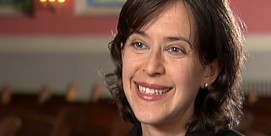In This Episode << SLIDE LEFT TO SEE ADDITIONAL SEGMENTS
Cathleen Falsani Interview
Watch religion columnist Cathleen Falsani, author of The Dude Abides: The Gospel According to the Coen Brothers, discuss theological and moral themes in films by Joel and Ethan Coen, including “The Big Lebowski,” which has inspired its own religion, and read excerpts from the extended interview:
A lot of their films—I would say all of the 14 films that they’ve done at feature length—have religious and spiritual content in them. This one [“A Serious Man”] is perhaps the most obvious, because it’s set in a Jewish academic milieu much like the one they grew up in themselves outside of Minneapolis, and you have overtly religious characters for the first time. You have three rabbis, you have a cantor, you have all the characters in the film, except for the goy next-door neighbor, are Jewish, and it takes place within a religious community on either side of Danny Gopnik, the protagonist’s son’s bar mitzvah, so in that way it’s sort of the most obvious. But it’s not the most, necessarily, the most spiritual of their films. It’s just the one people are going to go, “oh, that’s the Jewish one,” and it is a very Jewish film, but it’s not only a Jewish film. It’s more than that.
It really does address a universal, theological, nagging question and answers it, inasmuch as it can be answered, in a Jewish context. But the question itself is one that everyone, I think, experiences in his or her life, and that is: What is the meaning of suffering? Why do we suffer? If God is there and God is a good God, then why do bad things happen to decent people? I don’t care what flavor of spiritual person you are, or if you are a person of faith or not, there is no real good satisfactory answer to that. To their credit, the rabbis in the film don’t really try to give an answer. I think they kind of encourage the wrestling out of the answer, which is, in fact, in my estimation, to continue to live your life.
There is a quote that my book has toward the beginning from Rilke that says enjoy the questions for what they are, or appreciate the questions for what they are and try to live your way to the answer. I think that’s what this film and, in fact, most of the Coen brothers’ films that raise this kind of a question—it’s what they say.
Some people have wondered aloud if this is sort of a self-hating Jewish movie, and it most certainly is not that. While the rabbis, the religious people in the film, don’t have an answer; they, I think, come off in a kind of tender way. That’s the difference between the role of a rabbi and a pastor, I think, in some ways—Christian pastors. They are not supposed to have all the answers. They are wise people. They are learned men and women. They have studied, they know the traditions, but they are human like the rest of us. That’s how pastors are supposed to be, too, but sometimes we put them up on a pedestal as being more evolved spiritually. They may or may not be that. The fact that the rabbis don’t give him [Larry Gopnik] the answer he is looking for is not something to their detriment, and I don’t think the filmmakers intended that to be a slam, and I don’t think it is.
I think they [the Coen brothers] are looking back at a time in their life. In 1967, Joel, the older of the two brothers, would have been making his bar mitzvah, and the character of Danny Gopnik, the bar mitzvah boy, is maybe—maybe he is a little Joel, maybe he is a little Ethan. He’s a stoner. He’s basically a decent kid, but he’s just going through the motions making his bar mitzvah, and yet he still winds up learning something from this ancient rabbi, the one his father tries to get in to see and can’t. He actually sees Danny and has one of the better lines in the whole film. So it is a Jewish film. I don’t think it’s a pro or con Jewish film. They are certainly not self-hating Jews, and I think they are probably secular Jews now. I think that they look back as they are in their 50’s on their more religious childhood with a certain kind of tenderness and not a lot of bitterness. There are two things that come to mind in terms of the specifically Jewish themes or motifs in this film. One is this sort of the tradition of Judaism. There is a scene between Larry Gopnik, the protagonist, and one of his neighbors, and he is saying, “I don’t know what to do. What have I done? Why is Hashem, why is God doing this to me?” And she says the beautiful thing about being Jewish is that we have this shared history. We can go back and look at what other Jews have struggled with, so look to that, and she encourages him to go see the rabbi, and I think that is a specifically Jewish thing. They’re saying that in a Jewish context, and that’s something you hold on to, that tradition.
The other thing that is mentioned here in passing is a lamed vavnick, which is a story from Jewish mysticism that sort of grows out of the Sodom and Gomorrah story, where supposedly in every generation there are 36 righteous souls—lamed vavnick stands for 36—who hold up the fate of the world on their shoulders. Now nobody knows who they are. They don’t know who they are, but in this film when Sy Ableman’s character is dispatched, there is a question about whether or not he was actually a lamed vavnick, a righteous man, a serious man. But if you know anything, in fact, about the story about lamed vavnick, somebody like Sy Ableman would be the last person who would be a lamed vavnick. He was sort of unctuous, bloviating, faux-pious man, and that’s certainly not what a lamed vavnick is. In fact, maybe Larry Gopnik is a lamed vavnick who has all these things happen to him. We talk about him being Job, a modern-day Job, and certainly there are allusions to that biblical story, but perhaps he is something more than that. We just don’t know. He doesn’t know, and nobody around him knows either.
It’s a powerful film, but it’s a powerfully funny film as well, and in the Coens’ 25 years of filmmaking, it’s often their funniest films that are in some ways the darkest or the most serious spiritually, and I think that “A Serious Man” totally hits that nail on the head. It’s one of their best films, it’s a comic masterpiece, and I think it’s a spiritual masterpiece as well.
In sort of their typical, obscure way this film opens with a black screen and a quote from Rashi, who is a great Jewish sage. I mean, not many comedies would open with that kind of quote, but this one does, and it’s very Coen-esque to do it that way, wherein Rashi is talking about accepting everything that happens in your life with simplicity. Receive it with simplicity, he says. He’s not saying just accept what happens. It’s “take it at face value.” I think it makes life a lot easier if you do it that way, and then the film goes into this, for some people, strange 10-minute segment all in Yiddish, set in a shtetl years ago, that also retells another story from Jewish folklore, but it’s about if you just accepted the person who wound up at your door as the old rabbi that he said he was, rather than thinking that he’s a ghost, life might have been a little bit easier. The same thing could be said by the entire Larry Gopnik story line, that maybe it would be easier if he just accepted what was happening to him and not trying to answer the big “why?” question, because there is no answer to that question, at least not one that makes us any more comforted.
The Coen brothers are notoriously private for Hollywood types. I won’t say they are recluses, but they don’t like to divulge a lot about their personal lives or about the meanings of their films or the messages of the films, or why they do what they do, or the symbolism, certainly. But we do know a few things. We do know that they were raised outside of Minneapolis in St. Louis Park—that’s exactly the same place that the movie takes place; that they are Jewish; that their family was somewhat religious in that they went to Hebrew school, they made their bar mitzvahs. Their parents were both professors, and “A Serious Man” takes place in an academic setting. Larry Gopnik is a professor, Sy Ableman is a professor. They talk about now, more recently, how the whole Jewish religious thing is really not relevant too much to their lives. They don’t say a lot about what they believe or don’t, but their movies are filled with theological and metaphysical and existential questions and touchstones. Joel’s wife, Frances McDormand, the Oscar award-winning actress—her father and sister are both Disciples of Christ pastors. While they don’t have a whole lot of overtly religious characters in their films, many of them are set in a religious context. It’s just not stated, it’s not articulated obviously.
If you look at “O Brother, Where Art Thou,” that takes place in Depression-era Mississippi, and of course most of the people running for governor and everyone around them would have been church-folk. It’s a very Christian, Protestant place. In “Fargo,” for instance, another one of their more self-referential films in that they come from Minnesota—it’s set in Minnesota—it’s never said that all these characters with the Scandinavian and German last names are Lutheran, but obviously they are. I would be shocked if Marge Gunderson and her husband weren’t church-going, Ladies Guild-member Lutherans, and all of those contexts are, again, treated with a sort of tenderness—maybe not necessarily respect or an affirmation, but with a great tenderness for the decency that those ideas are at least supposed to inspire in people.
When I first told people that I was working on a book about the spirituality of the Coen brothers’ films, most people thought I was a) joking and b) that it would really be a short book. But when I started unpacking the films and why I was attracted to them—I am a huge Coen fan, always have been since I saw “Raising Arizona” when I was in college 20 years ago—and the films are so very different, and people are passionately Coen brothers fans when they are. When I look at something like that in culture I often think there’s a spiritual connection to it, when people are that passionate about something. It goes beyond fashion or funny to something deeper.
I started with “The Big Lebowski,” which is their most spiritual film, obviously tons of spiritual material to work with there, and then I started looking at the other films around it, and they often reference their earlier films in later films, and there’s a lot of inside jokes and stuff, and there’s just a lot of this content. I know it’s surprising. It’s not the top layer most of the time, but it’s there. That’s one of the beautiful things about the Coen brothers’ films, is that they are so layered with meaning and reference and joking.
People who aren’t familiar with the entire Coen brothers oeuvre know “No Country for Old Men.” They might know “Blood Simple,” their first film, they might know “Miller’s Crossing” or “Burn after Reading,” and all of those films are violent. There’s a lot of mayhem, they seem chaotic, and people have said to me there is no order, it’s just a chaotic universe. It’s a godless universe, and I don’t think that’s actually the case. I think there is a moral order to the Coeniverse, if you will. It might not be the moral order we were hoping for, but it’s there. I think the highest moral in the Coeniverse is to be decent. Some of that is reflected in what the Dude says in “The Big Lebowski”: “Just take it easy, man, it’s just your opinion, man. Like calm down, be decent.” But if you look at the heroes of their films, they are decent people. They might not be perfect, they might not be pious, but they are deeply, deeply decent. They are kind, they are respectful. Marge Gunderson is this moral anchor in this universe of unthinkable violence that befalls this little Minnesota town, and she always keeps her cool and she is always kind, even when she arrests Gaear Grimsrud, the almost catatonic killer who is feeding Steve Buscemi into a wood-chipper when she finds him. She gives him a chance to acknowledge that she is a police officer before she shoots him. She could just shoot him in the back, and she doesn’t, and then when she finally gets him in the squad car, she gives him this very serious but almost kind Sunday-school teacher talk: “All this for just a little bit of money, I just don’t understand it.” But she is always kind and affirming.
If you’re not good to women, if you abuse women in any shape or any way, you are in a lot of trouble in the Coeniverse. There is a line in “The Big Lebowski” that talks about somebody being a special lady: “Everybody is somebody’s special lady,” so we should treat women well. If you try to hide something, it’s going to be uncovered. Your sins will find you out. More than anything else, there is a reaction to every action that you take. Every choice—there is no such thing as an insignificant choice in the worlds that the Coens create. If you think they are, you’re usually corrected for it. I have fourteen Coenmandments at the end of my book, and those are just a few of them. The first Coen brothers’ film I saw was “Raising Arizona” when I was in college, and I loved the film because it was eminently quotable. It was one of those like “Caddyshack” and “Fletch,” really quotable and smart. Then I saw “Barton Fink” a few years later. I just remember walking out of the theater in a little town in the Midwest where I went to college and thinking, I have no idea what just happened. What was that? It was like the top of my head blew off. I think it took me about a decade to figure out what was really going on in “Barton Fink.” But after that I saw I think pretty much every film they made. It wasn’t until “The Big Lebowski” that I really got grabbed. Again, an eminently quotable film, but there was such a depth to the writing, such a spiritual depth I saw to what was going on, and every time I see the film I get something new and different out of it. I tend to look for God and for spirituality in places that some people might think are unlikely. I love writing about the intersection of faith and popular culture, and “The Big Lebowski” was just one of the best examples of that. So I started thinking, what about the other films? What about “Miller’s Crossing” or what about “The Hudsucker Proxy?” Is there this thread throughout all of their films that, in fact, I think there is? It’s stronger and louder in some films, but it’s there in all of them. It’s kind of, if you will, the rug that ties the room together, the spiritual questions that they have. It was really fun to go spelunking in the Coen brothers’ films looking for these little God bites and these little nagging existential questions that we all have.
I think “The Big Lebowski” is probably the only film in history to ever spawn its own religion. A number of years ago, a very clever guy named Oliver Benjamin, who lives in Thailand part of the year, formed something called “The Church of the Latter Day Dude,” or Dudism, if you will. You can actually be ordained online. I am in fact a duly ordained Dudist priest, and in most states in the United States you can actually marry people. I haven’t done it yet. I’m available for weddings and bar mitzvahs. There are 60,000 people who have become Dudist priests, and it’s a fairly active community. Yes, it’s tongue in cheek, but there is a certain ethos to this religion, even though it’s deeply casual, as we say. I think it’s probably more popular now than it was when it was first founded, and certainly I think we’re having a revival in Dudism right now with the new film and with the tenth anniversary of “The Big Lebowski.” It’s there, and it even has its own online shrine.
In “A Serious Man” it starts out with the issue of pot smoking which, clearly, the Coens don’t think is a moral issue. Danny Gopnik owes somebody $20 because he bought a lid of pot, and I think also back in the day, back in 1967, it was probably a little bit different than it is now. They don’t really dwell on the obvious “sins.” There is the infidelity, but more than that there is the false piety of Sy Ableman, the guy that Larry Gopnik’s wife is having an affair with. That’s the more egregious thing—being deceptive. Sy Ableman is a gossip monger trying to destroy somebody; that’s really, really bad, more than anything Larry Gopnik’s brother might be involved in. He gets busted for a few things, but they don’t dwell on that. Those are sort of more minor things. There might even be victimless crimes, if you will. Those bigger issues of how we treat each other and the lack of respect and the lack of humanity, those are the things that are more openly condemned, even if they are not condemned in the plot line. Even if the person who is committing them is heralded, there is a sense that we know in the end something bad is going to come back around. No good can come of that kind of behavior.







